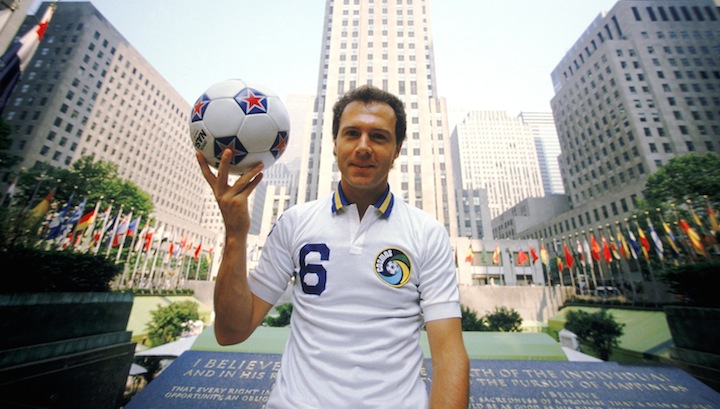Franz Beckenbauer is a name synonymous with German success. Whether that’s at the international or club level, his abilities were unrivaled. They inspired new positional and tactical awareness and have had scouts searching for Beckenbauer replicas ever since.
Countless team and individual awards spanning a 19-year playing career posit Der Kaiser as one of the finest players there has ever been and a pioneer of the modern sweeper as we know it.
Positional reinvention
Only a handful of soccer players throughout history can boast of their fame for revolutionizing a position, but Beckenbauer was a trailblazer.
Though there were sweepers before him, nobody conducted their business with such elegance, relentlessness, and dynamic manner of advancing forward with the ball from deep.
His domineering displays earned Franz the nickname Der Kaiser (translated to The Emperor), a title befitting such a commanding operator.
Former teammate Felix Magath describes Beckenbauer’s omniscience and omnipresence on the soccer field and how the sweeper’s in-game knowledge was head and shoulders above anybody else’s, making him one of a kind.
The ‘Libero,’ as the role has been referred to, stems from the popular tactical use in Italy, and further afield, of a player being positioned behind the defensive line to sense any danger which penetrates the defense and neutralizes those threats (or, if you like, sweeps).
Traditionally, defenses had been coached as a unit, with a strong emphasis on organization to nullify attacks through assigning defenders a player each to focus on – essentially, man-marking.
However, a ‘Libero’ was granted much more freedom (in Italian, ‘libero’ means ‘free’). A ‘Libero’ more often than not performed their duties zonally, sniffing out danger depending on where the threat was coming from.
The Athletic created a short yet informative video on the history of the role’s use and the associated progress we have seen over time.
Rare exceptions aside, that’s usually as far as the ‘Libero’ progressed. They would win the ball and then either bring it into the defensive midfield position or simply shift it straight away from very deep to a player deemed more creative to threaten the opponent. Well, Beckenbauer had other ideas.
Once Der Kaiser had won the ball in his sweeper position, he would join the attack through marauding dribbles or clever one-two passes to carve open the opposition.
He refined and modernized the role to offer his team another avenue of assault. He was an avant-garde innovator. Not only that, he performed each aspect of his duties to the degree that nobody had seen before.
The sweeper role was around before Der Kaiser, and it’s impossible to tell whether he was the main reason for Bayern Munich and West German fortune, but it’s hard to imagine such success without his famed abilities in either line-up.
Bearing fruit
The results of Beckenbauer’s capabilities are there for all to see; an enviable club career saw him lift three European Cups, five Bundesliga titles, four German Cups, a European Cup Winners’ Cup, three North American Soccer League titles, and an Intercontinental Cup. His international résumé boasts a World Cup and a European Championship for West Germany.
Despite being a childhood 1860 Munich fan, Beckenbauer spent the first 13 years of his career representing cross-city rivals Bayern Munich.
In his first season, Franz contributed to Bayern’s promotion-winning campaign mostly as an attacking outlet (and no, Bayern weren’t always the force they are now).
It wasn’t until Bayern were in the Bundesliga that Franz started to operate as a sweeper. He became an integral component of a side that soon conquered West German soccer and hasn’t really relinquished control since. He was the toast of Munich and would very soon write his name into German national history.
Franz Beckenbauer guided West Germany to European Championship glory in 1972 by overcoming the Soviet Union in the final. To nobody’s surprise, it was a season in which he won the Ballon d’Or. Der Kaiser was at the peak of his powers.
In the ’72 semi-final against Belgium, Beckenbauer was reportedly key to West Germany’s expansive style. His drives forwards, leaving the Red Devils in his shadows, were poetry in motion.
Even when he briefly looked human with an uncharacteristically sloppy pass in the competition’s final, he made up for it by accelerating beyond his opponents to regain possession and make amends.
For a glimpse of his genius on the biggest stage of them all, you should check out footage of Beckenbauer in the 1974 World Cup final against the Netherlands.
You’ll witness a composed technician effortlessly caressing every pass, gliding out of reach of his opponents as if they were amateurs (this was a great Dutch team, by the way), heading away what feels like every hopeful ball the Netherlands fired into the West German box, and visibly marshaling his back line with commands. It was a captain’s performance for the ages.
Franz Beckenbauer’s reign at Bayern Munich came to an end when he decided to accept an offer from America to play alongside Pelé for the now-defunct franchise New York Cosmos. Attendance figures for the Cosmos doubled from the 1976 season to the 1977 campaign.

It was a successful stint in the Big Apple, yet Der Kaiser knew there was no escaping Father Time, so when Hamburg came calling, he couldn’t resist one more crack at competing in Europe.
Despite the accolades his accomplishments had brought him and the stardom he was used to in this part of the world, Franz openly admits it was daunting for him to play back in his homeland. Injuries hampered his stint in Hamburg, but he still managed to collect a Bundesliga winners medal.
Cosmos’ coach at the time, Julio Mazzei, insisted that bringing Beckenbauer back to New York for his swan song was to improve the team, not to get fans through the turnstiles. Even as the sun set on his career, he proved that he hadn’t lost it, as Der Kaiser once again made it into the NASL All-Star team.
The modern Libero
It seems that one of the problems with the traditionally deeper use of a ‘Libero’ is that it doesn’t suit today’s tactical attraction to setting offside traps.
If you consider that defenses often move in coordinated units, having a sweeper risks exposing the defense because their “freedom” usually means they are not aligned to the movements of their co-defenders. The deeper the ‘Libero,’ the greater the likelihood of an attacker being onside.
If you didn’t have Franz Beckenbauer on your team, this could be an issue. To the relief of Der Kaiser’s teammates, he had an engine that never seemed to run out of fuel and pace to boot.
In fact, he regularly found himself in midfield positions when his sides were dominating games (or even dominating because of his advanced position), and there were fewer defensive duties to perform – this is often cited as the way he modernized the position.
Beckenbauer’s footprint in the game can be found not just behind the defensive line but in front of it as well.
The typical lynchpin players who dictate play in the Premier League today are a testament to Der Kaiser; Rodri at Manchester City, Fabinho at Liverpool, Jorginho at Chelsea – they all operate under the same principle of anticipating danger and becoming involved with attacks.
The main difference is that they are typically positioned as midfielders. Frenkie de Jong’s performances when at Ajax received plaudits not just because of what he did but because of how he did it.
This is how Franz Beckenbauer transformed the position. Many will list him as a defender, but he mastered the advancement of the role to become more of an attacking influence rather than solely defending.
If you had a player of his caliber, you could sweep up in defense and in midfield, a frightening thought for any opponent.
Positions are much more transient than they once were, and formations aren’t as rigid either. Freedom of expression on the pitch is no longer trademarked by the South Americans, and many accredit Beckenbauer as a catalyst for change. These types of versatile players are a priceless commodity to their managers, allowing tacticians flexibility in their approaches.
To the dugout and beyond
After retiring, Franz Beckenbauer stepped into management almost instantly. Such was the profile of the man; there were few protests to him being entrusted with steadying the West German ship which had sailed off course at Euro ’84.
In his two World Cup appearances as manager, Beckenbauer guided his country into both finals, winning the latter in Italy to elevate him to soccer immortality. And, of course, he did so by employing a sweeper, Klaus Augenthaler.
He went on to collect a Ligue 1 title medal with Marseille despite leaving his post early, then had some success with Bayern Munich years later, winning the Bundesliga and UEFA Cup. Mostly presidential and executive roles followed as he decided to take more of a back seat.
While the popularity of a sweeper has declined over the years, this doesn’t diminish the value the position once held and how it has influenced the modern game.
For that, we owe gratitude to Franz Beckenbauer. Every time he stepped out on the field, he ruled all. It was his empire. He was Der Kaiser.

